By: Izumi Hasegawa August 19, 2025
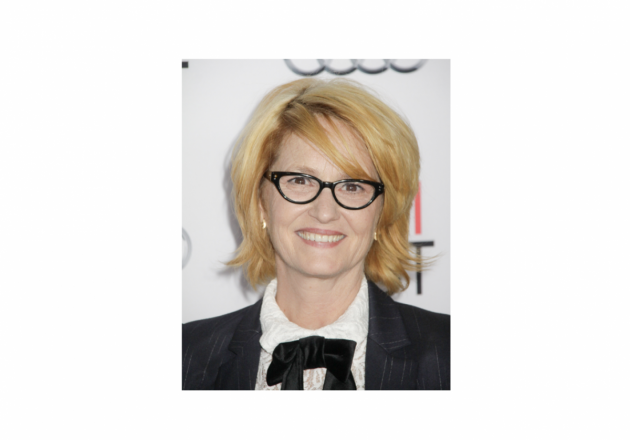
Melissa Leo has often played tough police detectives, and in her new film The Knife, she takes on another formidable detective role. But when I spoke with her, I found her to be surprisingly shy and deeply caring —and even revealed that her family has a special connection to Japan.
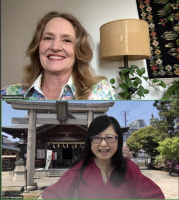
Q: Could you tell me how you came to be involved in this project?
Melissa Leo: I talked with the filmmaker. I was on the phone with Nnamdi Asomwa for about 10 minutes, maybe. And in that 10 minutes, that brilliant, brilliant man said all the exactly right things to me of how he felt that I would do something for his film that he couldn’t think of someone else to play the detective, except for me, which seems so high a compliment, I understood what he meant, because the film has a special, unusual quality to it. It’s not a film you’ve ever seen before. Do you agree with me? It’s like a new film of a thriller that stars this black family. It’s really about them and their experience, and to make the story move, you have to have this detective come in.
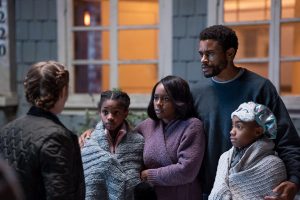
Q: The film is fascinating. It reminded me a bit of Rashomon—showing both the police perspective and a Black family’s perspective. It becomes a tragedy shaped by how differently the victim and the police are seen. The detective keeps saying that the intruder is the victim, which I found very striking. We often try to avoid having a perspective, but without realizing it, we sometimes put labels on people. Have you ever surprised yourself by unconsciously labeling someone? Have you had that experience?
ML: Well, I don’t know. I mean, if you’re asking me personally, if I’ve had that experience, I am a woman. I might be a white woman, but I am a woman in the world. And that sense of, you know, discounted I’m a woman who’s no younger, as young as I once was, discounted. It that sense of and an assumption of who I might be without knowing who I am or getting to know me. And I think what you’re saying about the film is really insightful, and you’re really right on the track that the director wants the film to live on, that it’s this thing of people are people, no matter what we look like. We’re all people. We all try our best, we all make mistakes, and we all sometimes really screw up. And that’s where this, the choices we all make as human beings, I don’t think that it matters what detective Carlson’s (Melissa Leo played) choices are. I know what they are. I’m not guessing at what she’s doing. I know what she’s doing as I play the role. But what’s really interesting is to see that the audience’s reactions to it, and I would say across the board, people from all different kinds of races begin to recognize things watching this film that they might not have recognized otherwise.
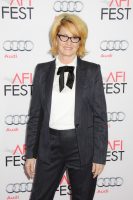
Q: The film is a good reminder that people often unconsciously put labels on others. Let’s talk about you. You’ve been acting since childhood, but what is the personal appeal of acting for you?
ML: Personally, for me, I’m just a very uncomfortable person. I’ve never been particularly comfortable in my own skin. I don’t really. For me, as a small child, although I didn’t work as a child, I was interested in acting from a very, very young age. And wherever I could do acting, I would do it in community theater, in acting schools, and eventually start to work in my early 20s. It just is. It’s really, honestly, Izumi. It’s the only thing that’s ever made any sense to me. I understand it. I understand how to read the script and how to ask the questions that an actor must ask, and how to then embody that character. And it brings me comfort and joy. Like people think, Oh, you’re acting. You’re in front of everybody. I’m so shy I couldn’t do that. But it’s because I’m shy. And then I can put on the costume. Today, I put on a bit of a costume to do the interviews. I’m really quite uncomfortable.

Q: So right now, you’re portraying Melissa Leo.
ML: Yes, absolute truth.
Q: You can see my background—that’s my home, a Shinto shrine in Japan. I’m from Japan.
ML: I wondered if you were in Japan, but it’s only a backdrop. You’re not there right now.
Q: No, I’m in Los Angeles now, but I come from a Shinto shrine family and grew up in Japan. Later, I moved to LA. I don’t know if you’ve ever been to Japan, but maybe it’s on your bucket list?
ML: Definite bucket list. I had a boyfriend I lived with many, many years, and he was a ski instructor. And after we were together, some of his very happiest years were skiing in Japan, and my grandfather was in the Air Force, and he loved Japan so much. Then, when all was done, he brought my grandmother back over. And when they would build their houses back home in Florida, they would build these Japanese tubs that he had seen when he was in Japan, and the Japanese wall, which is not really a wall, but it’s beautiful shelf, delicate, carved. And he built so many Japanese things in his home.
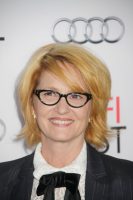
Q: One of the things I miss most about Japan is the Japanese bathtub! I might have to visit your grandfather’s house just to soak in one! [laughs] In Japan, turning 60 is called Kanreki—a celebration that marks completing one full cycle of life and symbolizes a kind of rebirth. Now that you’ve passed 60, could you share your dreams for the future, as if you’ve been reborn? And looking back, how would you describe your life so far?
ML: Oh, I have been so very blessed, and I think I understand what you’re saying of this rebirth. I think that we have from when we’re born until we’re 30, and this is one part of our life, and then we have from 30 until we’re 60, and this is another part of our life, and then we have from 60 to however long we have. And for me, I want to be myself. I want to break out of myself. I want to enjoy myself as I am older and wiser, I see very happy times ahead for me, and of course, I hope to continue working all through.
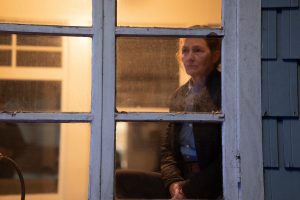
Q: What trends are you into right now? What do you enjoy doing these days?
ML: Oh, well. A few years ago, I started working very ancient Japanese art as well. It with clay. And I go very much, too much. I have clay pots all over my house now. And I bake clay. I make clay with bowls and cups and practical things, and then I build other things, and I work with at a studio, with all these other beautiful clay artists. And I wouldn’t really call myself a clay artist, but I love to play with the clay when I’m not working as an actor.
Q: Could you tell us about the next project you’re currently working on?
ML: Well, the next project is still a little up in the air. To say too much about it, I would say I did work on a thriller this past winter called the Passenger, which is a little, probably a little scarier of a movie than I would usually go to see myself, but wonderful Norwegian director, André Øvredal, was directing, and I talked to him and understood what he needed for the part. He was asking me to do, and I had a lot of fun working with him this winter. So I imagine this year the Passenger will be released. I’ve also worked many, many times with a young filmmaker by the name of John Swab. And I believe it might be the fifth film that I’ve made with John Swab. It’s about the Fentanyl crisis. It’s a beautiful movie. It’s about the way that fentanyl will kill everyone, whether you think you know what you’re doing, whether you know what you’re doing, if you don’t know what you’re doing, if you’re young, if you’re old, if you’re rich, if you’re poor, fentanyl can kill you. And goes into much detail of all of it, and some action two, and that’s going to be opening in the fall. It’s called King Ivory, which is another nickname for fentanyl. King Ivory.

Q: I have to wrap up, so thank you so much for taking the time. And thank you for saying my name—you’re the first actor to do that during an interview!
ML: My goodness gracious. Like to call people what their name is. I like that a lot. Sometimes people go, Oh, no, you can just call me Izzy, but this not your name. So, no, no. Thank you so much.
Q: Thank you.
The Knife is now in theaters.
